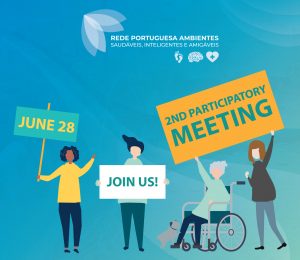LET’S DISCUSS Smart, Healthy and Age-Friendly Environments | June 28 in Faro
LET’S DISCUSS Smart, Healthy and Age-Friendly Environments in Algarve on June 28.
The Portuguese Network on Smart, Healthy and Age-Friendly Environments will hold an INTERNATIONAL EVENT + WORKSHOP on June 28, 2019, at the CCDR Algarve facilities, in Faro.
The meeting will be attended by Joan Martin, Executive Director of the Louth County Council (the first age-friendly city in Ireland) and President of the European Covenant on Demographic Change (World Health Organization affiliated entity), which will bring practical guidelines on “How to implement age-friendly environments for all ages?”.
It will also be the stage for Fernando Machicado, Secretary of CEN CENELEC and Manager of the Construction and Accessibility Programme of UNE, who will present the latest standard on “Accessibility and Usability of the built environment – Functional requirements” – prEN 17210, developed under the mandate M/420 of the European Commission.
The Discussion Table will bring together distinguished representatives of national public and private entities who will work together on the issue of accessibility and how to ensure that they are properly implemented, particularly in the context of funding from the Structural Funds.
This event privileges the participation of more than 70 members of the Network, but is open to any organization wishing to attend or participate. Sign up now as places are limited.
Consult the AGENDA of the event at: https://caritascoimbra.pt/wiki/agenda-2a-reuniao-participativa-da-rede-portuguesa-ambientes-saudaveis-inteligentes-e-amigaveis/
Access the REGISTRATION FORM at: https://docs.google.com/forms/d/1vzVcpWJSFRO-dAxkr8_Q7pjLdBbgG5–yf3E3G-6pC0/edit
You can consult all the relevant information of the Portuguese Network at https://www.caritascoimbra.pt/rede-portuguesa/pagina-inicial/
With more than 70 organizations officially registered as Members, the Portuguese Network on Smart, Healthy and Age-Friendly Environments brings together partners from all regions of Portugal, committed to promote a joint agenda for the implementation of Inclusive Environments for all ages, with particular incidence in the areas of Health, Social Support, ICT and Infrastructures.
The Network is energized by a Working Group, being the Technical Coordination ensured by Cáritas Diocesana de Coimbra | Carina Dantas and the Scientific Coordination by ESEnfC | João Apóstolo. It also has an Advisory Board that brings together 9 national reference figures: https://caritascoimbra.pt/rede-portuguesa/sobre-a-rede/.
The Network already has a place on the EU Health Policy Platform (https://webgate.ec.europa.eu/hpf/). This is the first network with a national area spoken in non-English language, which is officially created on this platform of the European Commission. It also integrates the International Ecosystem Group of the European Connected Health Alliance, which covers more than 78 countries and 16,500 participants (https://echalliance.com/page/EcosystemsOverall).
From its first participatory meeting, held in Coimbra in October 2018, the first Action Plan for the Network was drawn up, based on the following key themes:
- Influence on policies
- Business Models / Implementation
- Collaboration and communication
- Health and well-being throughout the life cycle
The Plan is already available online in Portuguese and English and can be consulted on the official website of the network – https://caritascoimbra.pt/rede-portuguesa/pagina-inicial/.
Action Plan | Portuguese Network PT – https://caritascoimbra.pt/wp-content/uploads/2019/03/Plano-a%C3%A7%C3%A3o_Rede-Port_2019_FINAL.pdf
Action Plan | Portuguese Network EN – https://caritascoimbra.pt/wp-content/uploads/2019/03/ActionPlan_Rede-PT_EN.pdf
Joint Statement SHAFE PT – https://caritascoimbra.pt/wp-content/uploads/2019/03/Joint-Statement_SHAFE_PT.pdf
Throughout the Plan the various challenges are presented, as well as the main actions to be carried out during 2019 for each of the defined themes. In each area and activity there are also participants and responsibles for each action, as well as the identification of outputs and results. These will be the target of a workshop in the afternoon of the event, energized by the various working groups.
